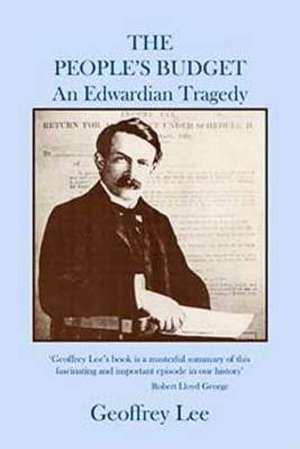People's Budget
Autor Geoffrey Leeen Limba Engleză Paperback – 30 apr 2008
Preț: 60.76 lei
Nou
Puncte Express: 91
Preț estimativ în valută:
11.63€ • 12.14$ • 9.62£
11.63€ • 12.14$ • 9.62£
Carte indisponibilă temporar
Doresc să fiu notificat când acest titlu va fi disponibil:
Se trimite...
Preluare comenzi: 021 569.72.76
Specificații
ISBN-13: 9780856832628
ISBN-10: 0856832626
Pagini: 80
Dimensiuni: 136 x 8 x 206 mm
Greutate: 0.12 kg
Editura: SHEPHEARD-WALWYN PUBLISHERS
Locul publicării:United Kingdom
ISBN-10: 0856832626
Pagini: 80
Dimensiuni: 136 x 8 x 206 mm
Greutate: 0.12 kg
Editura: SHEPHEARD-WALWYN PUBLISHERS
Locul publicării:United Kingdom
Notă biografică
Born in Kent, Geoffrey Lee was one of the authors of a major work on world trade and for many years worked on yearbooks for the Financial Times. The author of many short stories and articles in the national press, he became assistant editor of an architectural magazine and then deputy editor of Country Life. In retirement he worked for the Historic Houses Association.
Recenzii
Lloyd George and Churchill took the lead by framing a new budget, in which a large proportion of the revenue was to come from a tax on the rental value of land. This People's Budget was debated repeatedly and finally passed through the House of Commons in 1909. In 1920, the Coalition government abolished it altogether. I think Lee deserves admiration for his simple and straightforward storytelling and for having the courage to treat the subject with the kind of dignity it deserves.' Georgist Journal Winter 2009 'Lee's book is a well-written account of the machinations leading up to and surrounding a key moment for the modern world. The story Lee tells will surely become an increasingly important political and social reference in a post-recession world.' Land & Liberty Winter 2008/9 'Some historians argue that the introduction in 1908 of old age pensions, and unemployment benefits, for the very poorest class in Edwardian Britain, made the difference ten years later between revolution and democratic 'evolution'. Under Lloyd George's premiership in 1918-22, Britain experienced social dislocation, strikes, high inflation and unrest, but did not follow Russia and Germany towards revolution.' From the Foreword by Robert Lloyd George
